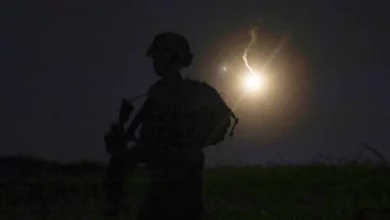The case of Ahmed Mostafa, an Egyptian blogger detained on charges of "disseminating wrong information" and "tarnishing the image of the military" has been postponed until 7 March.
Mostafa, a 20-year-old engineering student at Kafr el-Sheikh University, posted a blog entry about an alleged corruption case at a military school in February 2009, in which a student was arbitrarily dismissed in order to make room for another applicant. On 25 February, Mostafa was arrested in front of his university on the orders of Egypt’s Military Prosecutor and was detained for four days before being sent to trial at a military court on 1 March. He is being charged under Law 113/1956 of the Penal Code, which prohibits the publication of secret information concerning the Armed Forces.
The security risks of online activism in Egypt are well-known and documented by human rights watchdogs, but Mostafa is the first blogger to be sent to military trial, according to the Arab Network for Human Rights Information (ANHRI).
The first hearing took place on 1 March, where defense lawyers requested an adjournment in order to see all the evidence of the case. “The court has refused to give the lawyers full access to the documents and accused them of leaking information about the case to the press,” said Gamal Eid, director of ANHRI, which is handling the case, to Al-Masry Al-Youm. According to Eid, some evidence was labeled “confidential” and concealed from the defense lawyers.
"We were subjected to strict and unreasonable security measures, as well as the court is insisting on the presence of assigned defense, though we are Ahmed’s official defense. Ahmed has stated that fact to the court one and many times, but they would not listen,” Mohamed Mahmoud, an ANHRI lawyer present at the hearing, said in a statement published on the organization’s website.
“The whole defense today was focused on asserting that lawyers need to consult all documents in order to do their work,” Eid added. The defense’s strategy has been to show that the blog post was intended to expose corrupt practices, rather than disclose confidential information.
According to Mostafa’s defense team, the blogger’s password was turned over in January 2010 to security agents, who did not delete the post in question. Lawyers argue that this should raise important question about the case. Some speculate the adjournment may be the court’s response to pressure from the media and human rights groups, but Mostafa’s lawyers fear it is a strategy to obscure the improper way in which the case has proceeded. “After all, this is a military court and its judges are policemen. It is not a fair trial,” Eid added.
The Military Courts Law, passed in 1966 and amended in 2007, has been used against terrorism suspects since 1992. Military courts have been routinely condemned by human rights organizations. In a 2007 report by the London-based Amnesty International, the group criticized the lack of due process in military tribunals, and the denial of rights such as the right to an open case, the right to appeal rulings and the right to proper defense procedures.
Mostafa’s case has drawn criticism from international human rights organizations, such as the New York-based Human Rights Watch. In a recent statement, Joe Stork, deputy director of Human Rights Watch’s Middle East and North Africa division, said: “The government should not be prosecuting Mostafa at all, much less before a military court, with no possibility of appeal. Instead of looking into his accusations, the government is trying to silence him."
“This case highlights the increasing surveillance and control over blogs and social networks in Egypt and exposes the government’s lies about freedom of expression,” said Eid. He added that while Egypt has recently accepted recommendations at the Human Rights Council in Geneva regarding freedom of expression, “blogger intimidation continues to take place at the same time.”
Three bloggers are currently detained in Borg el-Arab prison in Alexandria: Mossad Abu Fajr for writing about human rights violations against the Bedouins of Sinai, Hani Nazeer for critiquing religion and Karim Amer for writing about sectarian violence and criticizing Egyptian President Hosni Mubarak.
While Mostafa is not the first to blog about military affairs, other bloggers who have done so in the past were silenced without being tried.




